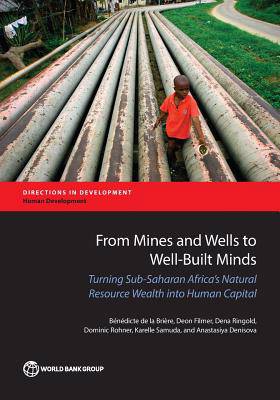
- Retrait gratuit dans votre magasin Club
- 7.000.000 titres dans notre catalogue
- Payer en toute sécurité
- Toujours un magasin près de chez vous
- Retrait gratuit dans votre magasin Club
- 7.000.0000 titres dans notre catalogue
- Payer en toute sécurité
- Toujours un magasin près de chez vous
From Mines and Wells to Well-Built Minds
Turning Sub-Saharan Africa's Natural Resource Wealth Into Human Capital
Benedicte De La Briere, Deon Filmer, Dena RingoldDescription
Sub-Saharan Africa's natural resource-rich countries have poor human development. Children in these countries are more likely to die before their first birthday, more likely to be stunted, and less likely to attend school than children in other countries with similar income. Despite the current price downturn, extractives will remain an important part of Sub-Saharan Africa's growth story--using resource rents wisely remains a long term challenge. Governments must choose how to allocate resource rents between spending, investing in human or physical capital, or investing in global financial assets. The return to investing in physical and human capital will be high in countries where the capital stock is low. Moreover, higher levels of human capital make investments in physical capital more productive, which suggests that the optimal portfolio will involve investing in both. Human capital should be prioritized in many of Sub-Saharan Africa's resource-rich countries because of the low starting point. Investing effectively in human capital is hard because it involves delivering services, which means coordinating a large number of actors and activities. Three dimensions of governance are key: institutions, incentives and information. Decentralization and leveraging the private sector are entry points to reforming institutional structures. Revenues from natural resources can fund financial incentives to strengthen performance or demand. Producing information, making it available, and increasing social accountability helps citizens understand their rights and hold governments and providers accountable. Improving the quality of education and health services is central to improving human capital. Two additional areas are promising. First, early child development--mother and newborn health, and early child nutrition, care, and education--improves outcomes in childhood and later on. Second, cash transfers--either conditional or unconditional--reduce poverty, increase household investments in child education, nutrition, and health, and increase the investment in productive assets which foster further income generation.
Spécifications
Parties prenantes
- Auteur(s) :
- Editeur:
Contenu
- Nombre de pages :
- 202
- Langue:
- Anglais
- Collection :
Caractéristiques
- EAN:
- 9781464810053
- Date de parution :
- 03-05-17
- Format:
- Livre broché
- Format numérique:
- Trade paperback (VS)
- Dimensions :
- 178 mm x 254 mm
- Poids :
- 362 g

Les avis
Nous publions uniquement les avis qui respectent les conditions requises. Consultez nos conditions pour les avis.






